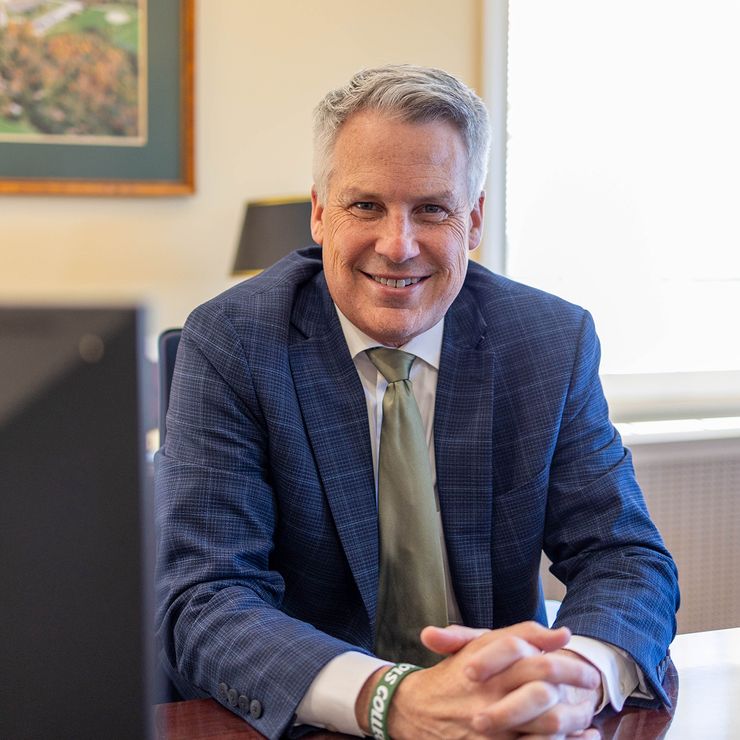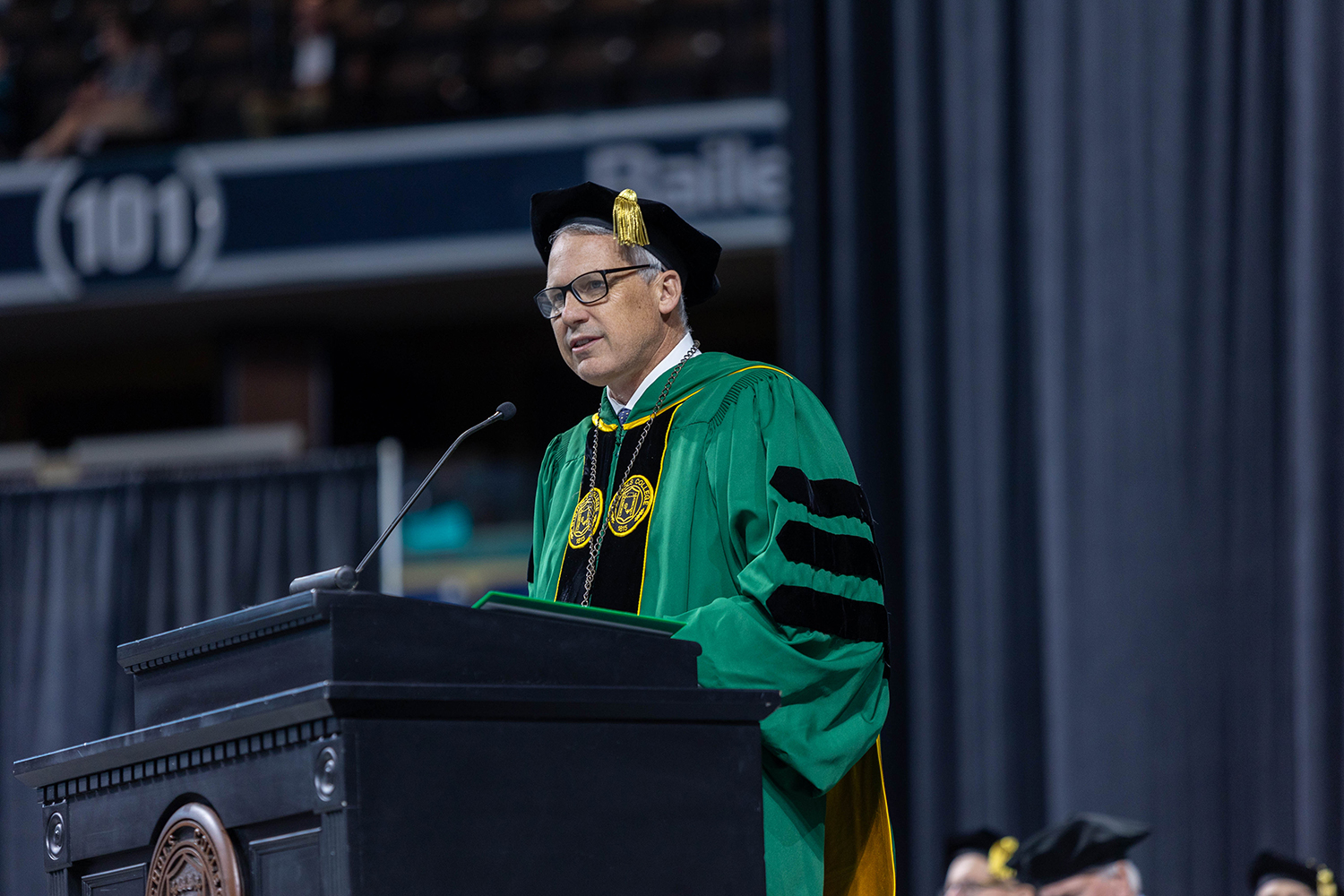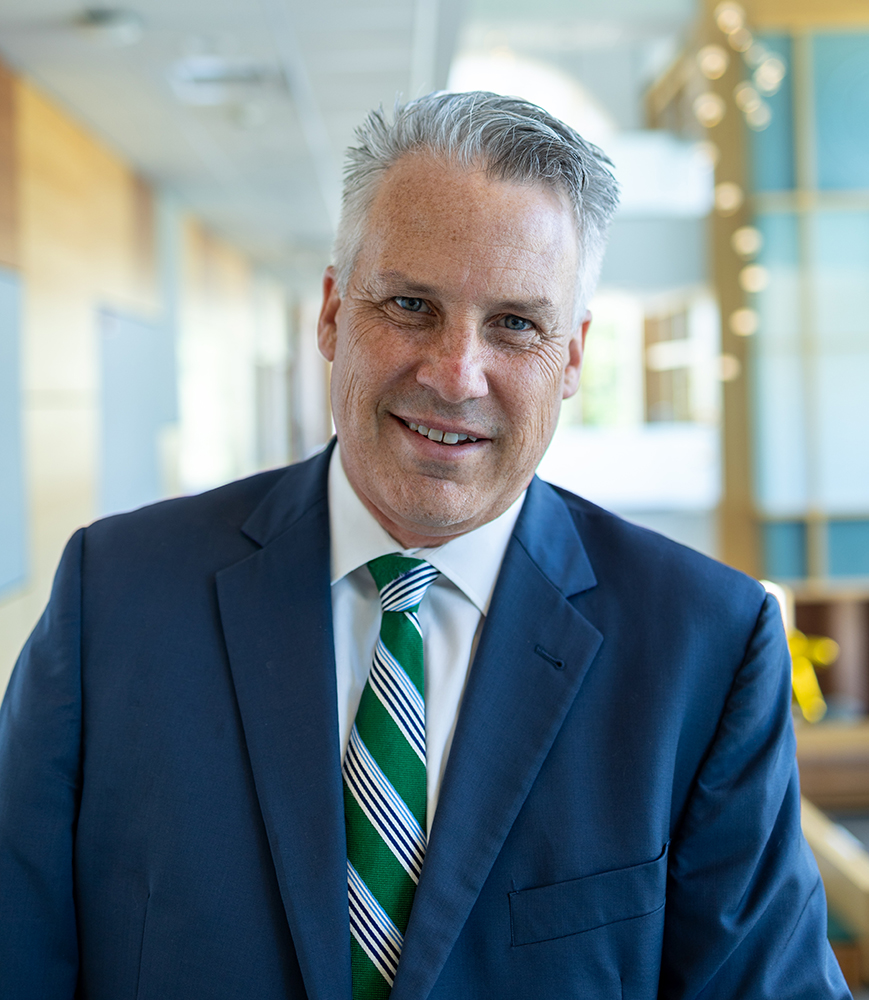Alumni Story
Bill Pieczynski ‘94

Bill Pieczynski ‘94
Admissions Tour Guide to College President
Majors: Business Administration and History
Currently Living In: Sturbridge, MA
This small-knit community had students participating in multiple opportunities: football players that were honor court judges, computer science majors that were tour guides for the admissions office. With professors who knew you well enough to call you out about skipping class when they saw you in the dining hall. ”
- Bill Pieczynski’s description of Catawba College in his inaugural speech as president of Nichols College

Bill originally made his way to Catawba College from just outside of Allentown, PA where he grew up. He had played competitive golf in high school and hoped to play golf in college, he explains, “so I was looking for a school in the south to play in college. I had received some information from Catawba and visited during a college tour with my parents. We immediately fell in love with the campus and the people.” Not only that, but the sense of Catawba College being a family extended to Bill’s family. “I vividly remember our admissions counselor at the time Elaine (Peterman) Holden who eventually became a family friend. She actually surprised me at my high school graduation party up in Penn!”
At Catawba, Bill played on the golf team all four years, three of them for Coach Bennett, and was a member of the Order of Blue and White. He met his future wife Lana ’92 while a student.
His decision regarding his choice of major had some deliberation behind it. “I was a bit unsure what my plans were to be for a career when I entered college, so thought a business degree would/could equip me for a variety of paths I might take following college. The Ketner School of Business was gaining a strong pedigree and Catawba had just built the new facility, Ketner Hall, that would house the program, which was certainly impressive.”
Bill also considered history as a major, having been raised by a father who taught that academic discipline in high school. “Growing up, we spent vacations going to Saratoga (NY). I didn’t know there was horseracing there until I was an adult. I knew it as a Revolutionary War battle site.” But Bill didn’t set out to major in history at first. It was only when one of his history professors pointed out that he needed just a couple more credits to have a major in history that he intentionally completed that as a major.
Bill cites several faculty members at Catawba as being influential on him as a student, including Dr. Charlie McAllister and Dr. Bruce Griffith in history, Dr. Erik Oldenburg in business, along with English professor Dr. Janice Fuller. Religion professor Dr. Barry Sang was also important to both Bill and Lana as students. And while Bill never had a class with Dr. Carl Girelli, he got to know him while Bill was working as a leader on orientations for a couple of years. Bill also served as chief justice on the honor court, for which Dr. Girelli was faculty advisor.
Bill’s first job out of college was in Catawba’s admissions office. Having been a student tour guide, it was a good fit. He worked in admissions for about five years and served as assistant coach for men’s basketball for three. He departed Catawba for three years to coach basketball at the Division I level before returning to Catawba in the development office where one of his primary fundraising responsibilities was athletic development. In 2006, he pursued an opening in fundraising at Nichols College in Dudley, Massachusetts. He felt well-versed in how Catawba did things; he was curious about how other schools handled their advancement efforts. Nichols was similar in size and family-oriented like Catawba. It felt familiar-yet-different. Bill started out as director of Nichols’ annual fund. Four short years later, with a successful $66 million fundraising campaign under his belt, he became the vice president for advancement. The campaign had far exceeded the initial goal of $45 million. It remains the largest fundraising campaign in Nichols’ history.

In the role of vice president of advancement, Bill got to know Nichols’ Board of Trustees. When the school’s president departed last fall, the Board asked Bill to serve as interim president while a presidential search was conducted. Not long after, they approached Bill and asked him to consider the presidency. “I told them I was fine either way. If they wanted to have that conversation, and if they then felt I was the right person and wanted me to step into the role, I would. But I would also be fine resuming the VP for Advancement role.”
Bill went through the interview process for the job of president of Nichols. “I’m not the traditional candidate coming from the academic side of the house with years of research and publishing listed on my CV. Rarely does a presidential candidate come into the position checking off all the boxes and every institution has different needs at different times. There were gaps I could fill and like every president, you figure out the rest.” Bill brings strengths to the role, including his deep care for Nichols and its community; he both knows them and is known by them. Among those strengths, he recognizes first-hand the importance of fundraising as a critically important responsibility of any college president.
Nichols College sits on a lush, 230-acre campus in central Massachusetts, not far from the City of Worcester—New England’s second largest city behind only Boston. With enrollment between eleven and twelve hundred students, it is a traditional undergraduate business school grounded in the liberal arts. It also offers five master’s degree programs, including an executive MBA. “Transforming students into leaders is the focus of curricular and co-curricular offerings here,” adds Bill.
Even now, serving in his new capacity, Bill can point to opportunities he had at Catawba which had a lasting impact on him. “Being a tour guide at Catawba was influential in how I understand higher education, learning the various aspects of a residential college. You learn it to present it on a tour, but you have to be informed and educated about many of the aspects of a residential campus. Not everybody gets access to that kind of information, and not every student learns about that, not even all faculty and staff learn about it. That opened my eyes. A college is a big operation, it’s like a small town. It helped me understand the scope of what these types of institutions do and how they serve their communities.”
Campus employment with Dr. Ken Clapp was another key student experience for Bill. “He was a big influence on me and many others. Getting to work with him, especially as a student, I learned about the administration. As a student, you are shielded from a lot of the operations of a college, but learning about the opportunities and challenges of a school like Catawba was helpful.” He learned something about the work of admissions, athletics, advancement, and alumni relations.
“Those two aspects, serving as a tour guide and working with Dr. Clapp, were certainly helpful throughout my career but still are today.”
One more thing he learned about higher education while at Catawba stands out to Bill. “It’s about the power of the people and the community you’re surrounded by. It comes down to having that campus atmosphere and culture: to work with other people, to respect them and appreciate them and collaborate with them. I came to appreciate that when I was at Catawba. We have that at Nichols, and I hope to continue to hone that type of culture here.” Valuing scholarship, character, service and culture sound familiar to Catawba graduates.
Bill and Lana are active in their church, and they enjoy family time. The couple’s three sons are all sophomores - the oldest two are both college sophomores - one at Villanova and one at Nichols, and the youngest is a sophomore in high school. He is also a competitive golfer so Bill and Lana are frequently going from course to course with him. It is also fitting that American history buff Bill and his family make their home in Sturbridge, Massachusetts, which is renowned for its Old Sturbridge Village living museum.
Bill is pleased and humbled at being chosen to serve Nichols College as its president. He says simply, “I intend to be as good of a steward of this institution as I’m capable of being.”
Spoken like a true-blue Catawba College alumnus.
